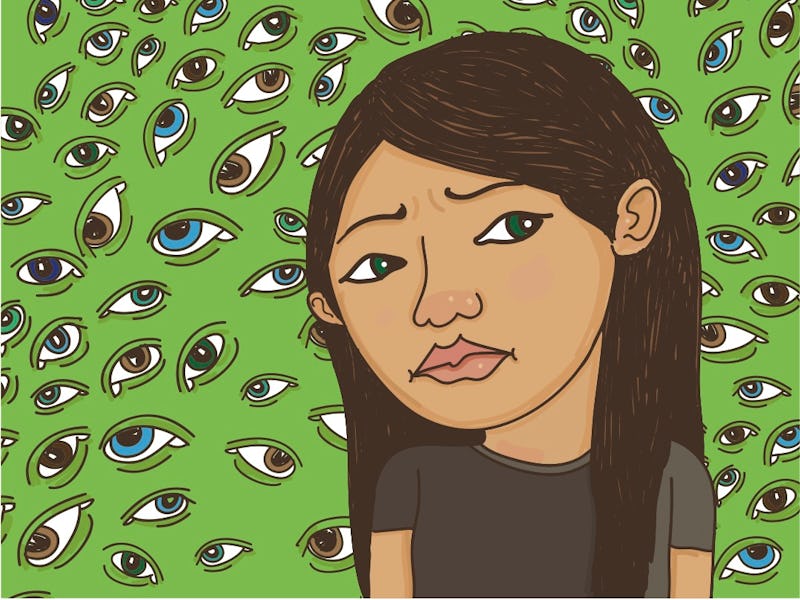Peer pressure psychology: Why social context shapes decision making
Experts say hijacking your social environment can transform your life.

When analyzing a puzzling choice made by a friend or a hostile run-in with a stranger, it’s tempting to blame the individual. There must be something about their character traits or personality that caused their behavior, right?
However, rather than focus on those factors, experts say it’s better to consider the social forces surrounding individuals when they make a decision. That’s because, according to over a century of research, humans are profoundly social creatures who are shaped by their collective environments.
Robert Frank is a professor at the SC Johnson business school at Cornell University and author of Under the Influence: Putting Peer Pressure to Work. He tells Inverse that other people influence us whether we want to admit it or not.
“That's a hard truth,” Frank says. “The effects they have on us are often impossible to avoid any more easily than you can avoid secondhand smoke.”
But peer pressure isn’t all bad. According to Frank, it is possible to sway social environments to become healthier and happier. Doing so could even solve some of the biggest problems of our time, like climate change or political polarization.
This week, Inverse dives into the psychology of peer pressure -- how our friends, colleagues, and even strangers influence our behavior. It turns out, we're a lot less independent thinking than we might like to believe.
I’m Ali Pattillo and this is Strategy, a series packed with actionable tips to help you make the most out of your life, career, and finances.
Under (peer) pressure
There are a number of reasons why human beings are so heavily influenced by others. Partially, it’s because looking toward others and following the group is critical information-gathering. From birth to death, we observe, mimic, and mirror those around us to learn what it means to be human.
As much as certain headstrong, independent people might like to think, one’s social environment permeates and shapes behavior on a daily, if not a minute-to-minute, basis. Peer pressure goes far beyond high school parties and beer pong.
“None of us as an individual knows everything we need to know about how to cope with every situation we might encounter, Frank says. “But collectively, we actually know quite a bit about the world.”
However, even when people have all the information about a decision at their fingertips, they still have an impulse to favor one choice over another based on the group’s preference. Research has shown peer pressure and social context are strongly linked to academic success, food preferences, use of drugs and alcohol, and environmental behaviors.
“The effects they have on us are often impossible to avoid any more easily than you can avoid secondhand smoke.”
“If you see a group of people behaving in a certain way, and if you didn't have at least an impulse to investigate whether it might be in your interest to do whatever it is they're doing, you'd probably be maladaptive to life as we know it," Frank says.
Some of our social biases also stem from a deeply rooted desire to belong. If we make choices along with the crowd, odds are we're less likely to be alienated.
Importantly, while the social environment shapes choices, the social environment itself is “a consequence in the aggregate of the choices we make as individuals,” Frank explains.
We can also overlook our own potential, as individuals, to influence a group.
“Our own influence as an individual on the herd's path is so small that we, for all practical purposes, ignore it,” Frank says. But Frank says even one individual’s choices can snowball into larger social forces.
Since few people are truly immune to social influence, it's crucial to carefully construct our social webs with people we respect and aspire to be more like.
“Choosing your workmates, choosing your friends, choosing where you live -- often we don't have wide latitude and those choices, but when we do, it's really important to pay attention to them,” Frank stresses.
Conversely, Frank suggests thinking critically about how your behavior -- the decision to run, smoke, or spend money -- subconsciously impacts others. The better choices we make on our own have lasting effects on those around us.
Two ways social dynamics help and hurt us:
1. Social isolation. Loneliness actually triggers the same pathways in the brain that are involved in processing emotional responses to physical pain. It's also associated with poorer health outcomes like high blood pressure, depression, and cognitive decline.
2. Family and friends. In a 2019 study, researchers found that strained family relationships can worsen chronic conditions like headache and stroke more than strained relationships with romantic partners or friends. Meanwhile, strong family ties can boost an individual’s life expectancy and health.